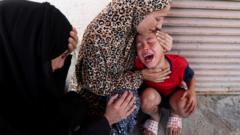As Israel escalates its ground offensive near Khan Younis, Nasser Medical Complex faces a dire fuel crisis, jeopardizing life-saving treatment for patients. The hospital, now unable to admit new patients, is on the verge of catastrophic failure, with staff warning that loss of power could lead to immediate deaths of those in critical care.
Nasser Hospital on the Brink of Catastrophe Amid Intensifying Conflict in Gaza

Nasser Hospital on the Brink of Catastrophe Amid Intensifying Conflict in Gaza
Fuel shortages and Israeli military maneuvers threaten critical medical services at Gaza's largest hospital, prompting urgent calls for assistance from medical staff.
Gaza's healthcare system teeters on the edge of disaster as the largest operational hospital, Nasser Medical Complex, battles severe fuel shortages amidst a widening Israeli military offensive. Doctors at the facility have raised alarms over an impending crisis, with reports of Israeli troops approaching dangerously close to the hospital in Khan Younis, rendering the situation increasingly perilous.
On Thursday, the hospital ceased accepting new patients as Israeli tanks advanced into a nearby cemetery, firing shells and bullets, which heightened fears among medical staff and patients already inside. The ongoing conflict has prompted evacuation orders for surrounding areas, exacerbating the urgent needs of those still seeking shelter within the hospital.
Reports from inside the hospital illustrate a grim reality, with medical personnel sending desperate messages stating, "We are closer to death than to life" as they navigate the looming threat of complete power failure. The hospital, which usually accommodates around 350 patients, has found itself overwhelmed, treating nearly 700 individuals due to the surge in trauma cases related to the ongoing hostilities.
Adding to the pressure, the World Health Organization has described Nasser as "one massive trauma ward," with critical medical supplies and resources dwindling. The facility is now functioning with limited electricity, relying on backup generators that are estimated to last only one more day. Without power, patients relying on ventilators face imminent danger, highlighting the life-and-death stakes involved.
Israeli military reports indicate that some fuel has entered Gaza, aimed at supporting hospitals and humanitarian efforts; however, the logistics of distribution remain unresolved. This has left medical staff scrambling to conserve power and manage dwindling supplies in a crisis marked by lack of basic necessities.
Tragedy struck once more near an aid distribution site in Rafah, where reports confirm that 10 individuals lost their lives due to Israeli military fire. The persistent violence complicates ongoing negotiations for a ceasefire, as Prime Minister Netanyahu indicates potential progress on a hostage release deal, although indirect talks remain stalled.
As the humanitarian situation deteriorates further, both medical officials and patients at Nasser Hospital are left pleading for urgent intervention amid a relentless conflict that has tragically claimed thousands of lives since the onset of hostilities in October.





















